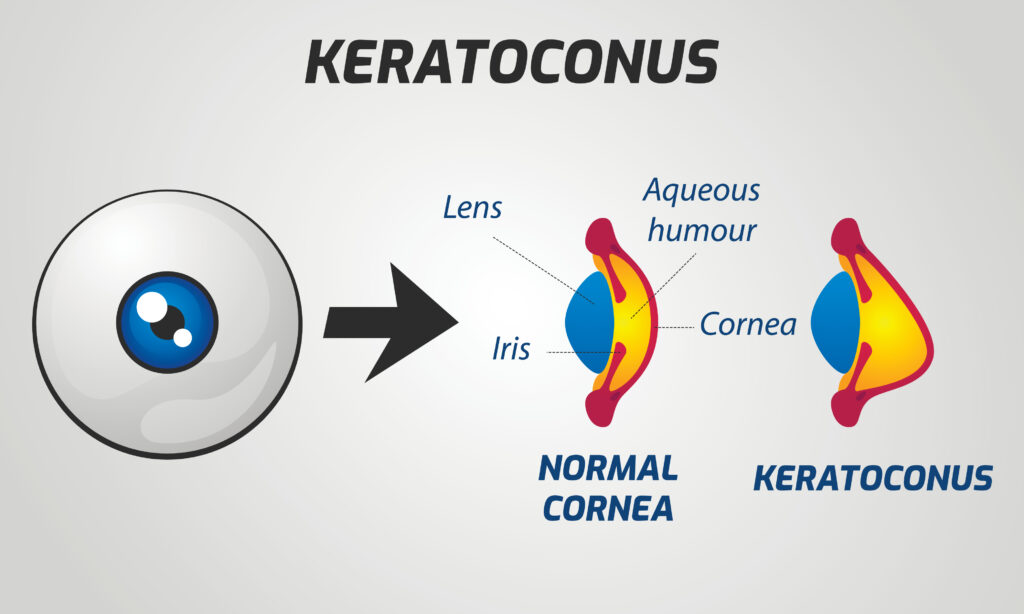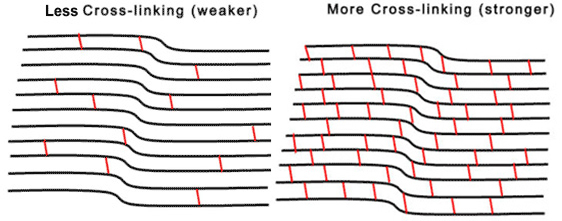Posted by: Clear Advantage in Featured on March 29, 2024
Do you have keratoconus but still want to improve your vision? You may want to improve your vision using a procedure like LASIK.
However, procedures like LASIK are not always the best fit for this eye condition. Even if you’re not a good candidate for LASIK because of keratoconus, other options remain.
Keep reading to learn if you can still get LASIK if you have keratoconus!
What is Keratoconus?

Keratoconus is an eye condition that affects the shape of the cornea, the transparent outer layer at the front of the eye. In a healthy eye, the cornea is round, like a baseball.
But if you have keratoconus, the cornea gradually thins and bulges outward into a cone shape. Keratoconus usually starts in teenagers or the early twenties.
However, the eye condition can also develop earlier or later in life. It tends to progress slowly, worsening for some time before vision stabilizes. It also usually runs in families and is more common if you have certain medical conditions, such as allergies, asthma, and Down syndrome.
How Does Keratoconus Affect Your Eyes and Vision?
Keratoconus changes the curvature and shape of the cornea, which causes vision problems. The cornea should be smooth and evenly curved so it can focus light into the eye for clear vision.
However, if the cornea is an abnormal shape, it scatters and distorts light as it enters the eye. In its early stages, keratoconus leads to mild blurriness and distorted vision.
You may also notice your glasses prescription changing more frequently as the eye condition progresses. As keratoconus worsens and progresses, you may experience more severe problems with your vision, like:
- Increased nearsightedness and astigmatism
- No longer being able to correct your vision with visual aids
- Seeing Glare and halos around lights
- Increased light sensitivity and eye irritation
- Sudden worsening or cloudy vision
An abnormally shaped cornea makes it more challenging to see clearly, even if you wear glasses or contacts. As the cornea bulges forward, scarring may develop.
In advanced cases of keratoconus, you may notice corneal swelling, leading to a sudden, significant loss of vision. You can develop keratoconus in one or both eyes, with differing symptoms in the eyes.
Who is a Good Candidate for LASIK?

LASIK is an incredible laser eye procedure that can provide qualified patients with visual freedom from glasses and contact lenses. It corrects refractive errors like nearsightedness, farsightedness, and astigmatism.
To be a good candidate for LASIK, you should be at least 18 years old, be healthy, have a stable prescription that’s remained unchanged for a year or more, and have no underlying eye conditions. Other factors for LASIK candidacy include:
Corneas that are Thick Enough
A crucial part of LASIK and its effectiveness is having thick enough corneas. The procedure may lead to serious visual problems if your corneas are too thin.
LASIK uses lasers to reshape your cornea and correct refractive errors. If your corneas are too thin, there won’t be enough tissue left after reshaping the cornea to improve your vision.
Healthy Corneas
You also need to have healthy corneas to undergo LASIK. If you’ve experienced corneal scarring, have irregular astigmatism, or suffer from certain corneal disorders, this will affect your LASIK candidacy.
Stable Vision
LASIK is most effective if you have a stable prescription. If your eyes are still changing, you must wait to have LASIK.
You’re in Good Health
You must be in good health to be a good candidate for LASIK. If you have certain autoimmune conditions or diabetes that aren’t under control, recovering after LASIK may be more challenging.
Your eye doctor will evaluate your eyes and health to determine if you qualify as a candidate for LASIK. You also need to have realistic expectations about what LASIK could achieve if you have it.
Can You Get LASIK if You Have Keratoconus?
Unfortunately, if you have keratoconus, you will not qualify as a good candidate for LASIK. Keratoconus causes the cornea to become thinner over time while also structurally changing the way the eye works, making it unsafe to undergo LASIK.
There are a few key reasons why you should not have LASIK if you have keratoconus:
Corneal Thickness
Your corneas are thinner than normal with keratoconus, especially where the cornea bulges out. Because of the eye condition, you likely won’t have enough corneal tissue to allow for the cornea to be reshaped during LASIK.
Corneal Stability
Keratoconus is a progressive condition that causes continued changes to the shape of your cornea. Getting LASIK with this eye condition makes the LASIK procedure less predictable. You may also not have permanent results if you have unstable corneas.
Corneal Weakening
As keratoconus worsens, it causes the cornea to become thinner, leaving the cornea weaker and more vulnerable. Undergoing a vision correction procedure like LASIK could lead to increased destabilization of your corneas.
Not only is LASIK unlikely to provide you with the visual results you want if you have keratoconus, but the procedure could worsen your vision. LASIK may trigger a faster progression of keratoconus changes.
There’s also a risk of more vision-threatening complications like ectasia, where the cornea bulges out even further.
Corneal Cross-Linking

While LASIK isn’t a good option for keratoconus, corneal cross-linking is one of the best ways to treat it. Corneal cross-linking is best for those diagnosed with progressive keratoconus.
Corneal cross-linking uses UV light and vitamin B2 eye drops to create new bonds between collagen fibers in the cornea, stiffening them. These bonds, or “crosslinks,” strengthen the cornea. Although corneal cross-linking will not correct vision, it will stop the progression of keratoconus. Choosing corneal cross-linking can help patients avoid the need for a corneal transplant later in life.
Do you need to treat keratoconus? Request an appointment at Clear Advantage Vision Correction Center in Portsmouth, NH, now to learn more about this eye condition and whether corneal cross-linking could be the right treatment for you.






